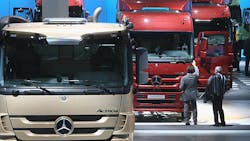Daimler AG, Paccar Inc.’s DAF and other truckmakers agreed to pay European Union regulators a record 2.93 billion euros ($3.23 billion) in fines for fixing prices of medium- and heavy-duty vehicles over 14 years.
Daimler got the largest penalty of 1.01 billion euros ($1.11 billion) and DAF will pay 752.7 million euros ($829.22 million) as part of a settlement with the European Commission that cut potential fines. Volvo AB and its Renault trucks brand face a 670.4 million-euro ($738.55 million) fine and CNH Industrial NV’S Iveco will pay 494.6 million euros ($544.88 million).
The penalties could ultimately rise if Scania AB gets fined. The Swedish truckmaker, which is now part of Volkswagen AG, has contested the outcome of the investigation. Fellow Volkswagen unit MAN SE provided evidence on the cartel and got its punishment waived.
Fines are high because “this cartel concerns a very large market and it continued for a very long time,” EU Competition Commissioner Margrethe Vestager told reporters in Brussels Tuesday. The companies’ actions fixed the prices for around nine out of every 10 medium and heavy trucks sold in Europe, she said.
The fines hit truckmakers at a time of fierce price pressure in Europe and declining demand in North America, Brazil and Russia. Daimler, the world’s biggest commercial-vehicle manufacturer, cut its trucks forecast in May, saying profits will be “significantly lower.” Volvo started cutting manufacturing in North America and Brazil in February and promised further reductions on Tuesday, as it reduced its North American forecast on stagnant freight volumes and excess inventory.
The auto industry is the focus of investigations by competition authorities across the world. The fines exceed an initial 1.7 billion-euro ($1.87 billion) penalty for banks after the Libor scandal.
Scania said in a statement that the company fully cooperated with the EU and can’t comment on what will happen next in the probe.
“The company doesn’t share the commission’s view on the findings of the investigation,” said Susanna Berlin, investor relations manager at Scania.
MAN SE, also owned by Volkswagen, escaped fines for being the first to inform the EU of the cartel. It avoided a potential 1.2 billion-euro ($1.32 billion) fine, the EU said.
Starting in 1997 with a meeting of senior managers in a Brussels hotel, the companies set the factory price of trucks and coordinated the timing and the passing-on of costs for new emissions technologies, the EU said. The probe didn’t examine whether they avoided or manipulated compliance with pollution standards.
Huge fines for cartels are the Brussels-based commission’s ultimate weapon to punish companies that cheat by fixing prices. The regulator — which is still probing banks over foreign-exchange manipulation — doled out massive penalties in 2013 for companies accused of rigging benchmark interest rates.
The trucks settlement includes a 10% reduction for promising not to challenge the EU in court, as well as other discounts for cooperating with regulators. Truckmakers may still face lawsuits from customers seeking damages for overcharging.
“Daimler regrets these occurrences” and said the fine would be covered by its provision, according to an e-mailed statement from the German automaker. Paccar said the DAF fine is less than the 850 million euros ($936.41 million) it had set aside.
Volvo’s fine exceeded its provision of 650 million euros ($718.08 million). The extra 20 million euros ($22.03 million) will have a negative impact on operating income in the third quarter, the company said in a statement. CNH Industrial declined to comment. The company had allocated $502 million ($553.03 million) for a fine for Iveco.
By Aoife White, with assistance from Elisabeth Behrmann, Stephanie Bodoni, Chris Reiter, Naomi Kresge, Christoph Rauwald, Andrew Clapham and John Martens
About the Author
Bloomberg
Licensed content from Bloomberg, copyright 2016.
